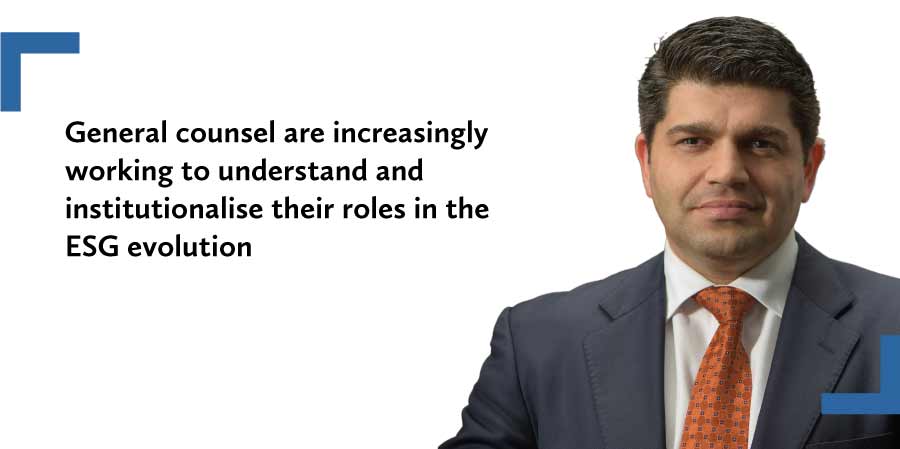For general counsel, embracing responsible governance may not be easy, but it is the right thing to do, writes Mike Madden, global board chair of the Association of Corporate Counsel
INVESTOR FOCUS on environmental, social and governance-related (ESG) issues is intensifying. According to a 2020 Trends Report by the US Forum for Sustainable and Responsible Investment, total sustainable investment assets under management in the US alone reached USD17.1 trillion at the end of 2019, a 42% increase from 2018. Bloomberg Intelligence forecasts that “global ESG assets are on track to exceed USD53 trillion by 2025, representing more than a third of the USD140.5 trillion in projected total assets under management”.
As a result, general counsel are increasingly working to understand and institutionalise their roles in the ESG evolution, and are quickly solidifying their position as a true partner to the business and an indispensable member of the executive team.
The ESG function itself has also evolved considerably with the focus, once primarily on environmental issues, shifting to include communication, transparency and equity in the workplace. This shift has greatly affected how businesses approach governance and social matters, and has brought into focus and placed greater emphasis on each branch of the ESG function. These functions are becoming increasingly part of regular business functions, with greater oversight and responsibility by the legal department on the regulatory and compliance requirements.

Businesses operating in or with links to developed economies have been regulated in areas such as modern slavery, anti-bribery and corruption, anti-money laundering, and health and safety and employment matters. These obligations are increasingly regulated by disclosure and reporting requirements that are aimed at driving greater transparency and accountability on ESG factors. That in turn is leading to these increased levels of activism and litigation risk as it becomes easier to scrutinise corporate behaviour, resulting in more demands by stakeholders such as shareholders, institutional investors and the broader public for an even greater focus on ethical, sustainable and responsible approaches to a variety of ESG-related issues.
GCs have played and continue to play a critical role in helping their organisations to engage with this fast-changing and demanding landscape, while meeting stakeholder expectations. In that context, in-house teams are required to not only manage the legal risks relating to their organisation’s ESG agenda, but also need to navigate the potential reputational risks regarding the company’s ESG commitments and performance.
You must be a
subscribersubscribersubscribersubscriber
to read this content, please
subscribesubscribesubscribesubscribe
today.
For group subscribers, please click here to access.
Interested in group subscription? Please contact us.
你需要登录去解锁本文内容。欢迎注册账号。如果想阅读月刊所有文章,欢迎成为我们的订阅会员成为我们的订阅会员。
Mike Madden is the global board chair of ACC. The ACC is the largest global legal association for in-house counsel, spanning 85 countries and with more than 43,000 members.





















